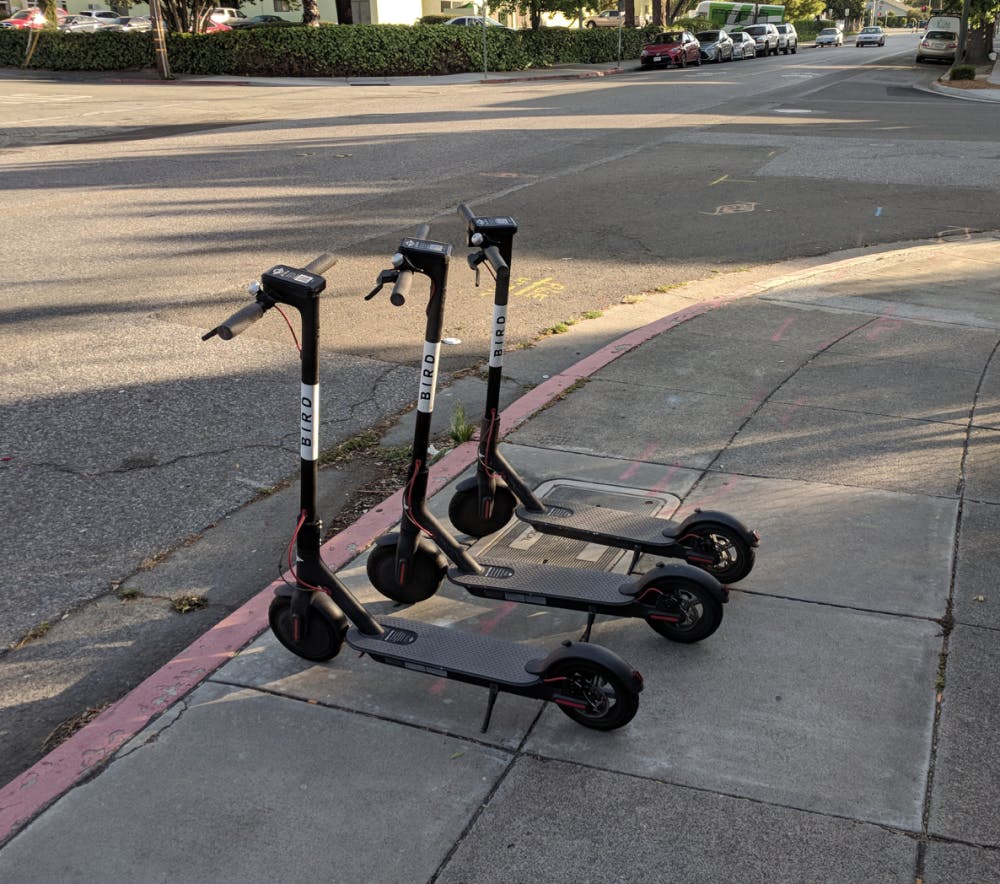By: Danny Nolan
Dockless scooters are everywhere, whether we’ve asked for them or not. We’ve ridden them, fallen off of them, thrown them into rivers, burned them and improperly parked them, causing MUPD to go on a bird hunt. So what’s the deal, are these actually healthy for the environment? Am I making a positive impact by riding them the three minutes to my 8:30 because I wanted some extra sleep and am too hungover from 90’s?According to Lime, “Through the equitable distribution of shared scooters, bikes and transit vehicles, we aim to reduce dependence on personal automobiles for short distance transportation and leave future generations with a cleaner, healthier planet.” The similar company, Bird, also states, “Bird’s mission is to make cities more livable by reducing car usage, traffic, and carbon emissions.” Both organizations have the same goal - reducing car usage and dependence, but have they been successful?Let’s investigate. According to an analysis done by Cleantech Rising, an online news publication on environmental issues going around the world, it’s estimated a scooter runs for 10 miles a day on average, equating a reduction of 3,500 grams of carbon per scooter. An average city with 10,000 scooters would reduce emissions by 35 metric tons daily, assuming that these scooters are actually replacing car usage. Taking these statistics and scaling it up across 500 cities, that’s reducing carbon usage by 17,500 metric tons each day. The article goes through a couple more details about how much less carbon it takes to charge these scooters versus using a car, and concludes that the scooter usage is the “equivalent of taking 105,000 cars off the roads around the world each day.”But that’s only if these scooters replace cars.However, I’ve seen a lot of people take these scooters to class, to bars, from bars, all in place of easily walkable distances. I’m no hypocrite, riding these things are fun, and it’s easy and accessible when you need to get somewhere quick, wake up late or are just straight up lazy. But is replacing walking, which is emission-free, with dockless scooters– which are manufactured in China, creating more e-waste, transported all over the world, charged night after night, and then picked up by people circulating cities in cars– necessarily the best idea for the environment?While Lime and Bird both aim to reduce the carbon intensive short car ride, a lot of these scooter uses are just for fun or for an even shorter ride, still in the end, creating a negative impact where one wouldn’t necessarily occur. Isn’t not creating a negative impact on the environment, better than creating the most minimal impact imaginable? Recycling only works if there’s someone on the other side of the equation willing to deal with our waste. In the end, this same concept needs to be applied to these dockless scooters. For a better understanding of e-waste, check out one of GreenHawk’s articles from October here. It’s more environmentally friendly to reduce our impact, then maybe recycle what we deem recyclable. If we truly want to reduce our emissions and lessen our negative impact on the planet, it’s about not creating any waste at all. Instead of prioritizing our present needs by what’s convenient, it’s about prioritizing the needs of future generations by preserving the planet.
According to an analysis done by Cleantech Rising, an online news publication on environmental issues going around the world, it’s estimated a scooter runs for 10 miles a day on average, equating a reduction of 3,500 grams of carbon per scooter. An average city with 10,000 scooters would reduce emissions by 35 metric tons daily, assuming that these scooters are actually replacing car usage. Taking these statistics and scaling it up across 500 cities, that’s reducing carbon usage by 17,500 metric tons each day. The article goes through a couple more details about how much less carbon it takes to charge these scooters versus using a car, and concludes that the scooter usage is the “equivalent of taking 105,000 cars off the roads around the world each day.”But that’s only if these scooters replace cars.However, I’ve seen a lot of people take these scooters to class, to bars, from bars, all in place of easily walkable distances. I’m no hypocrite, riding these things are fun, and it’s easy and accessible when you need to get somewhere quick, wake up late or are just straight up lazy. But is replacing walking, which is emission-free, with dockless scooters– which are manufactured in China, creating more e-waste, transported all over the world, charged night after night, and then picked up by people circulating cities in cars– necessarily the best idea for the environment?While Lime and Bird both aim to reduce the carbon intensive short car ride, a lot of these scooter uses are just for fun or for an even shorter ride, still in the end, creating a negative impact where one wouldn’t necessarily occur. Isn’t not creating a negative impact on the environment, better than creating the most minimal impact imaginable? Recycling only works if there’s someone on the other side of the equation willing to deal with our waste. In the end, this same concept needs to be applied to these dockless scooters. For a better understanding of e-waste, check out one of GreenHawk’s articles from October here. It’s more environmentally friendly to reduce our impact, then maybe recycle what we deem recyclable. If we truly want to reduce our emissions and lessen our negative impact on the planet, it’s about not creating any waste at all. Instead of prioritizing our present needs by what’s convenient, it’s about prioritizing the needs of future generations by preserving the planet. 
Images via Giphy and Wikimedia

